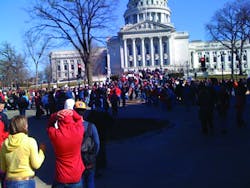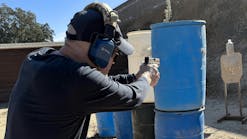An article on management techniques for policing in a liberal community appeared in the February 2011 issue of LET called "Policing the Left" (Page 26). Coincidentally, though it was planned as a profile featuring three agencies across the nation that have successfully built partnerships with their communities of above-average liberal reputations, the article turned accidentally prophetic. One of the departments featured, the Madison (Wis.) Police Department, got its hands full shortly after that issue was published with hundreds of thousands of demonstrators flooding the State Capitol's landmark Capitol Square.
The article recounted how the department, with 438 sworn, has built a camaraderie and trust over four decades as well as how teamwork, transparency and trust were all involved in the winning formula for law enforcement and community fusion. Within weeks of that article, the department got the chance to prove its policing strategy.
In early February, the agency was overwhelmed by demand as thousands (at one count more than 70,000) of protestors swarmed to the Capitol with signs, chants, drums and marching to protest (with a couple thousand in the minority protesting the protestors) against a controversial bill by the state's recently elected Gov. Scott Walker.
Weeks before there was even thought of a rally, and prior to when Walker's budget repair plans had been revealed, Madison Police Chief Noble Wray told contributor Michelle Perin he thought it was important to be transparent about the good and the bad. "It gives the community a sense of what we can and can't do. I think it's equally important when things are going wrong and they can see it and see how an agency responds under those circumstances."
Fast forward several weeks to Feb. 24 when in response to reports that Gov. Walker had "thought about" planting troublemakers among the demonstrators at the Capitol in a secretly recorded phone conversation, Wray swiftly posted an open response on the department's Web site clearly outlining his feelings on the matter within hours of the news. "I find it very unsettling and troubling that anyone would consider creating safety risks for our citizens and law enforcement officers," Wray wrote. "Our department works hard dialoguing with those who are exercising their First Amendment right, those from both sides of the issue, to make sure we are doing everything we can to ensure they can demonstrate safely. I am concerned that anyone would try to undermine these relationships."
As of press time, the budget repair bill issue between Walker and the protestors had not been resolved, and the Department of Administration announced a plan regarding clearing the Capitol building for scheduled cleaning that may upset the demonstrators. Some issues are still in the air and the outcome unpredictable, so it's too early to decry victory or otherwise for those issues.
But as mentioned in the February article, Madison is sometimes called the birthplace of the Progressive Movement, and during the last couple weeks it's done much to hold that title. In addition to the city's political inspiration, Madison PD's law enforcement strategy upheld its title thus far too, building off of previously established community trust, multi-agency teamwork and transparency in swift response. I was proud to see these foundations were hard at work in the more than two weeks of a continuous rally taking place on Madison's turf, proving its word through action and showing its peers nationwide true colors worth tapping into.

Tabatha Wethal | Editor
Award-winning writer Tabatha Wethal is a previous editor leading Law Enforcement Technology magazine and assisted with other publications. She was with the magazines since 2007.



